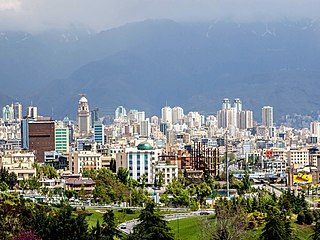
Iran is a mixed economy with a large public sector. Some 60% of Iran's economy is centrally planned.. Iran’s economy is characterized by its hydrocarbon, agricultural, and service sectors, in addition to manufacturing and financial services, with over 40 industries are directly involved in the Tehran Stock Exchange. The stock exchange has been one of the best performing exchanges in the world over the past decade. With 10% of the world's proven oil reserves and 15% of its gas reserves, Iran is considered an "energy superpower".
The knowledge economy, or knowledge-based economy, is an economic system in which the production of goods and services is based principally on knowledge-intensive activities that contribute to advancement in technical and scientific innovation. The key element of value is the greater dependence on human capital and intellectual property as the source of innovative ideas, information and practices. Organisations are required to capitalise on this "knowledge" in their production to stimulate and deepen the business development process. There is less reliance on physical input and natural resources. A knowledge-based economy relies on the crucial role of intangible assets within the organisations' settings in facilitating modern economic growth.

Research and development, is the set of innovative activities undertaken by corporations or governments in developing new services or products, and improving existing ones. Research and development constitutes the first stage of development of a potential new service or the production process.
A citation index is a kind of bibliographic index, an index of citations between publications, allowing the user to easily establish which later documents cite which earlier documents. A form of citation index is first found in 12th-century Hebrew religious literature. Legal citation indexes are found in the 18th century and were made popular by citators such as Shepard's Citations (1873). In 1961, Eugene Garfield's Institute for Scientific Information (ISI) introduced the first citation index for papers published in academic journals, first the Science Citation Index (SCI), and later the Social Sciences Citation Index (SSCI) and the Arts and Humanities Citation Index (AHCI). American Chemical Society converted its printed Chemical Abstract Service into internet-accessible SciFinder in 2008. The first automated citation indexing was done by CiteSeer in 1997 and was patented. Other sources for such data include Google Scholar, Microsoft Academic, Elsevier's Scopus, and the National Institutes of Health's iCite.
Professional services are occupations in the service sector requiring special training in liberal arts and pure sciences education or professional development education. Some professional services, such as architects, accountants, engineers, doctors, and lawyers require the practitioner to hold professional degrees or licenses and possess specific skills. Other professional services involve providing specialist business support to businesses of all sizes and in all sectors; this can include tax advice, supporting a company with accounting, IT services, public relations services or providing management services.

The Fairtrade Foundation is a charity based in the United Kingdom that aims to help disadvantaged producers in developing countries by tackling injustice in conventional trade, in particular by promoting and licensing the Fairtrade Mark, a guarantee that products retailed in the UK have been produced in accordance with internationally agreed Fairtrade standards. The foundation is the British member of FLO International, which unites FLO-CERT, 25 National Fairtrade Organisations and 3 Producer Networks across Europe, Asia, Latin America, North America, Africa, Australia and New Zealand.

The European Foundation for Management Development (EFMD) is an international not-for-profit association based in Brussels. Europe's largest network association in the field of management development, it has over 890 member organizations from academia, business, public service and consultancy in 88 countries. EFMD provides a forum for networking in management development.

The Corruption Perceptions Index (CPI) is an index which ranks countries "by their perceived levels of public sector corruption, as determined by expert assessments and opinion surveys." The CPI generally defines corruption as an "abuse of entrusted power for private gain". The index is published annually by the non-governmental organisation Transparency International since 1995.

Affect, in psychology, refers to the underlying experience of feeling, emotion, attachment, or mood. In psychology, "affect" refers to the experience of feeling or emotion. It encompasses a wide range of emotional states and can be positive or negative. Affect is a fundamental aspect of human experience and plays a central role in many psychological theories and studies. It can be understood as a combination of three components: emotion, mood, and affectivity. In psychology, the term "affect" is often used interchangeably with several related terms and concepts, though each term may have slightly different nuances. These terms encompass: emotion, feeling, mood, emotional state, sentiment, affective state, emotional response, affective reactivity, disposition. Researchers and psychologists may employ specific terms based on their focus and the context of their work.

The ease of doing business index was an index created jointly by Simeon Djankov, Michael Klein, and Caralee McLiesh, three leading economists at the World Bank Group, following the release of World Development Report 2002. The academic research for the report was done jointly with professors Edward Glaeser, Oliver Hart, and Andrei Shleifer. Though the first report was authored by Djankov, Klein, and McLiesh, and they continue to be listed as "founders" of the report, some sources attribute the genesis of the idea to Djankov and Gerhard Pohl. Higher rankings indicated better, usually simpler, regulations for businesses and stronger protections of property rights. Empirical research funded by the World Bank to justify their work show that the economic growth effect of improving these regulations is strong. Other researchers find that the distance-to-frontier measure introduced in 2016 after a decision of the World Bank board is not correlated with subsequent economic growth or investment.

Professor Dylan Jones-Evans OBE PhD FRSA was born in Bangor, Gwynedd and brought up in Pwllheli on the Llyn Peninsula. He is currently Assistant Pro-Vice-Chancellor (Enterprise) and the chair in entrepreneurship at the University of South Wales. He is visiting professor of entrepreneurship at the University of Turku in Finland, newspaper columnist and the creator of the Wales Fast Growth 50, an annual barometer of entrepreneurial firms in Wales.

Research and development intensity is generally defined as expenditures by a firm on its research and development (R&D) divided by the firm's sales. There are two types of R&D intensity: direct and indirect. R&D intensity varies, in general, according to a firm's industry sector, product knowledge, manufacturing, and technology, and is a metric that can be used to gauge the level of a company's investment to spur innovation in and through basic and applied research. A further aim of R&D spending, ultimately, is to increase productivity as well as an organization's salable output.

Vietnam is a dynamic developing economy with a relatively high growth rate. The energy sector plays a key role in promoting the country's socio-economic development. Vietnam has a diverse energy fuel resource of various types such as coal, natural gas, petroleum, hydropower and renewables such as solar and wind energy. The country has recently been successful in renewable energy deployment, especially solar and wind power development. Coal has been the key power generation source since 2018. Coal accounted for about 30% of installed capacity and 47% of electricity generation in 2021 The high use of coal makes Vietnam an increasingly important emitter of carbon dioxide, contributing to climate change.
Globalization and Health is a peer-reviewed open-access public health journal from BioMed Central that covers the topic of globalization and its effects on health. Globalization and Health was the first open access global health journal available when it came out in 2005. By 2022, the editors in chief were Ronald Labonté, Greg Martin, and Katerini Storeng.

Multidimensional Poverty Indices use a range of indicators to calculate a summary poverty figure for a given population, in which a larger figure indicates a higher level of poverty. This figure considers both the proportion of the population that is deemed poor, and the 'breadth' of poverty experienced by these 'poor' households, following the Alkire & Foster 'counting method'. The method was developed following increased criticism of monetary and consumption based poverty measures, seeking to capture the deprivations in non-monetary factors that contribute towards well-being. While there is a standard set of indicators, dimensions, cutoffs and thresholds used for a 'Global MPI', the method is flexible and there are many examples of poverty studies that modify it to best suit their environment. The methodology has been mainly, but not exclusively, applied to developing countries.
Springer Nature or the Springer Nature Group is a German-British academic publishing company created by the May 2015 merger of Springer Science+Business Media and Holtzbrinck Publishing Group's Nature Publishing Group, Palgrave Macmillan, and Macmillan Education.
Prashant Goswami is an Indian computational geoscientist, climatologist and the director of the National Institute of Science, Technology and Development Studies, New Delhi. He is a former scientist at the Fourth Paradigm Institute and is known for his studies on the tropical atmospheric variability across the time scales. The Council of Scientific and Industrial Research, the apex agency of the Government of India for scientific research, awarded him the Shanti Swarup Bhatnagar Prize for Science and Technology, one of the highest Indian science awards for his contributions to Earth, Atmosphere, Ocean and Planetary Sciences in 2001.
In 2011, the Economic Community of West African States (ECOWAS) adopted a Policy on Science and Technology (ECOPOST).










